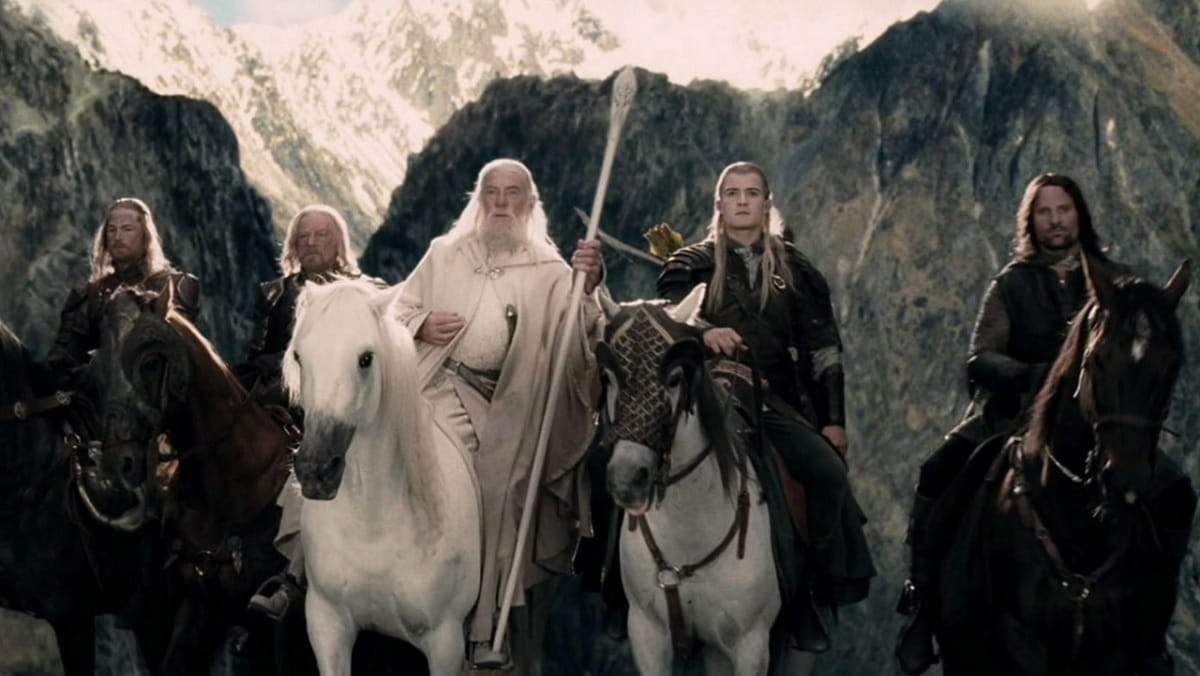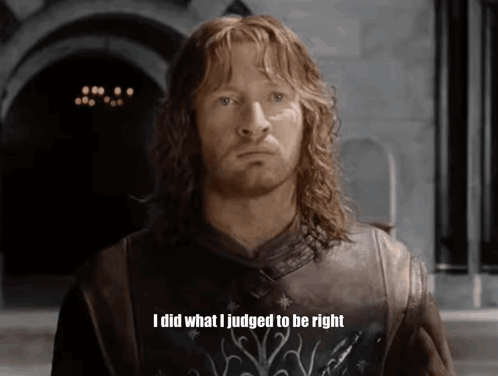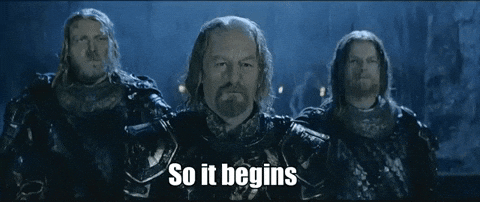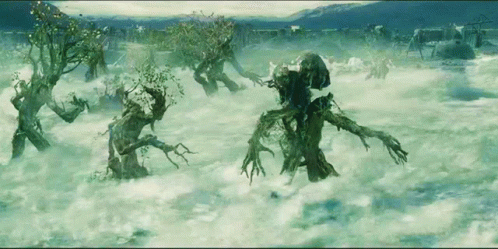The Lord of the Rings: Why Doing Good for Its Own Sake Matters
There's a reason we read fiction. It teaches us more lessons than we can possibly learn in one life. This week, I explore 'The Lord of the Rings' and Tolkien's message on the importance of doing good.

Warning: This post will contain spoilers for The Lord of the Rings (mostly for The Two Towers). If you’re concerned about this…well, what are you doing? The book came out when Eisenhower was president, and the movie came out a full year before LeBron played NBA basketball. Get to reading/watching if you’re still concerned about spoilers!
My girlfriend and I enjoy watching franchises.
This past fall, I read Harry Potter for the first time at her encouragement. I would read a book then we’d watch the movie.
I enjoyed the books much more than I thought (despite J.K. Rowling’s intolerable stances muddying their legacy). I was also fascinated by the things that were added to or omitted from the movies.
Obviously, there are things you have to cut, especially later in the series, to adapt a 600+ page book into a roughly 2-hour movie, but I couldn’t believe how some significant pieces were omitted such as Winky the house elf.
Nevertheless, we enjoyed working through a series this way.
Earlier this year, I decided to give Lord of the Rings another try, partially because I never finished the 3rd book, but also because it was another series where I could alternate between books and movies.
I started with The Hobbit. I love the book (I think it’s my favorite of Tolkien’s). The movies took some time; they are maybe the one case where the adaptation actually added quite a bit more than the book included.
That’s all good and well. The Hobbit films are ok. Nowhere near as good as the book, but they’re interesting fantasy/action movies.
I was particularly surprised upon revisiting The Lord of the Rings movies. Afterall, these are Oscar-winning films and universally beloved.
I couldn’t help asking myself, “why did they make these changes?”
All three changes I’m going to discuss below pertain to ones I’ve noticed in the film adaptation of The Two Towers. I think the changes detract from the points that Tolkien so eloquently makes in his books.
Tolkien demonstrates the importance of doing good in a much more nuanced way because the message is simple: it’s good to do good.
Strength of Character in the Face of Temptation
A major change from page to screen is the characterization of Faramir, brother of Boromir.
We first meet Faramir when Frodo and Sam are being led by Gollum towards Mordor. The hobbits are taken back to a secret location where Faramir becomes increasingly aware of who the hobbits are and what they’re doing.
In the movie, Faramir realizes that Frodo is in possession of the One Ring. His response is to essentially kidnap Frodo and Sam and force them to head towards Gondor.
The group stops at Osgiliath, where the humans are attacked by Sauron’s forces. Only at this point does Faramir come to his senses and decide to free Frodo and Sam so that they can continue their quest.
When faced with imminent defeat and potentially losing the ring to the enemy, Faramir makes a sensible decision, hoping to keep the ring out of Sauron’s hands.
This plays out differently in the book.
Faramir does come to the same realization that Frodo possesses the One Ring, but instead of forcing the hobbits to go to Gondor, Faramir keeps the secret.
He admits that he could take the ring if he wanted to, but he doesn’t. Unlike his brother, Faramir knows that this relic isn’t something for men to toy with.
He makes the decision to let Frodo go free not because the enemy is pressuring his forces but rather because it’s the right thing to do.

The strength of character Faramir shows in the books is significantly more powerful than in the movies.
One might think it’s more impressive that Faramir vacillated from wrong to right in the film, but I think it’s nobler that Faramir was aware of the danger ahead of him and still chose to let Frodo go free.
Faramir does the right thing because he knows it’s right. Not because he just doesn’t want the other side to win.
Acting Without Expecting a Return
Another example of people doing good for the sake of good is the men of Rohan, the Rohirrim.
In the book and the movie, King Theoden and the Rohirrim (for various reasons) are resistant to join the war on the side of Gondor. They’ve accepted their fate and want to batten down the hatches for the end of the world.
Sure, Theoden isn’t thinking entirely clearly during this time. He is under the spell of a creepy little guy, but there is a general hesitancy toward aiding Gondor.
In the movie when Rohan has retreated to Helm’s Deep to await Saruman’s attacking Uruk-hai, an unexpected ally joins to help the men. A group of elves decides to take up arms and defend Helm’s Deep alongside the humans.
On the surface, the “Rule of Cool” is probably at play. Elves are cool. Audiences like them. It surely doesn’t hurt the fantastical element of the movie to have them appear.
On a deeper level, though, I think this move weakens the point Tolkien tries to make.

The conflict at Helm’s Deep is a domino that leads to Rohan joining the war on the side of Gondor. Theoden could justify this because he and his people received outside aid. The elves helped Rohan, so Rohan should help Gondor. Let’s keep things karmically balanced.
In the book, no elves come to help Rohan. They are only saved when their own people (with some help from Gandalf) join the battle at the last second. Rohan saves itself.
I think this is an important distinction again because Rohan decides to join the war simply because it is the right thing to do.
It is noble and just to help out your neighbors when they are in need.
It’s not always about paying forward a good deed done to you. At some point, someone has to initiate that first good deed.
Doing Good with Intention, Not by Chance
A final example I’ll include is our tree friends, the Ents. The Ents are encouraged by Pippin and Merry to join the fray and fight against the orcs and Saruman.
In the movie, Merry and Pippin know that forces are on their way to attack their friends. The hobbits want the Ents to go to Helm’s Deep.
Despite this, the Ents take a humorously long time to debate, stopping after a couple hours to determine that the hobbits are in fact not orcs.
Fast forwarding to the end of the debate, the Ents decide to abstain. Merry and Pippin trick the Ents into getting involved by asking the Ents to drop them off just past Isengard.
Upon seeing the destruction that Saruman has wrought there, the Ents can’t help but lash out. They are reactive and not proactive.

The Ents of the book are much more interesting characters.
First, we don’t see much of this long debate. The hobbits are taken aside to let it unfold. It’s not treated as comedic relief but rather a sacred cultural feature.
The Ents are also much more aware of what’s going on. They know the forest and are aware that Saruman is destroying it.
Ultimately, the Ents do decide to join the fight (albeit briefly). They don’t decide to fight alongside the Rohirrim themselves (they send like semi-conscious trees to help, sure), but they do decide to fight Saruman.
Regardless, they’re fighting on the same side as our protagonists.
The Ents aren’t foolish. They don’t get accidentally lulled into battle. They deliberate and conclude that they will act according to their beliefs.
It isn’t always necessary to do as the Rohirrim do. The Ents know their limits, but they still join in on the fight. They still do good intentionally, not accidentally.
What to Do with the Time Given to You
In my high school’s weight room, we had a sign that said, “character is what you do when no one is watching.” That motto reminds me of these examples from the books.
Faramir’s men aren’t watching when he refuses the ring (yes, Frodo and Sam are, but they are at Faramir’s whims).
King Theoden and his people could deny ever getting a request from Gondor.
The Ents could retreat further into their woods and leave the fighting to the men and the orcs.
We don’t have to do good, but we should. And that, I think, is Tolkien’s message. I believe that message is a thesis in the series.
Furthermore, our help might look different from one person to the next, but the important part is that you help.

While I enjoy the fantasy genre, I think this message (along with others that Tolkien interweaves into his stories) is what elevates the novels of The Lord of the Rings.
It’s a reminder that doing good can have a positive impact, no matter how big or small. It’s also a reminder of why we read books and even fiction. There are lessons to be learned.
Do you agree that it’s important to help those in need? Is it right to do good simply for the sake of doing good?
If you found this post interesting, please consider subscribing so that the next post gets delivered straight to your inbox!
